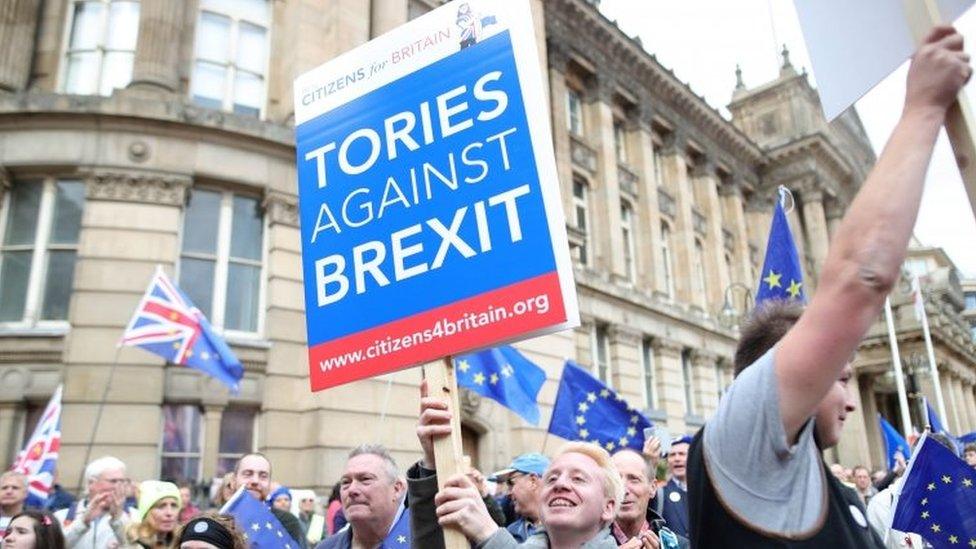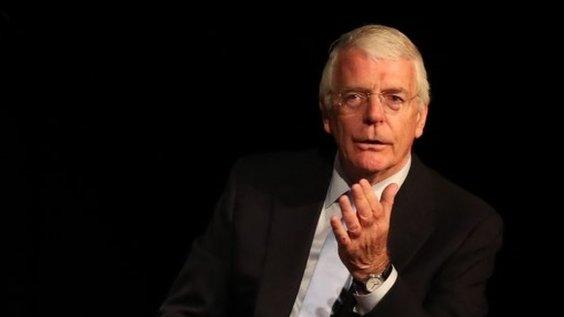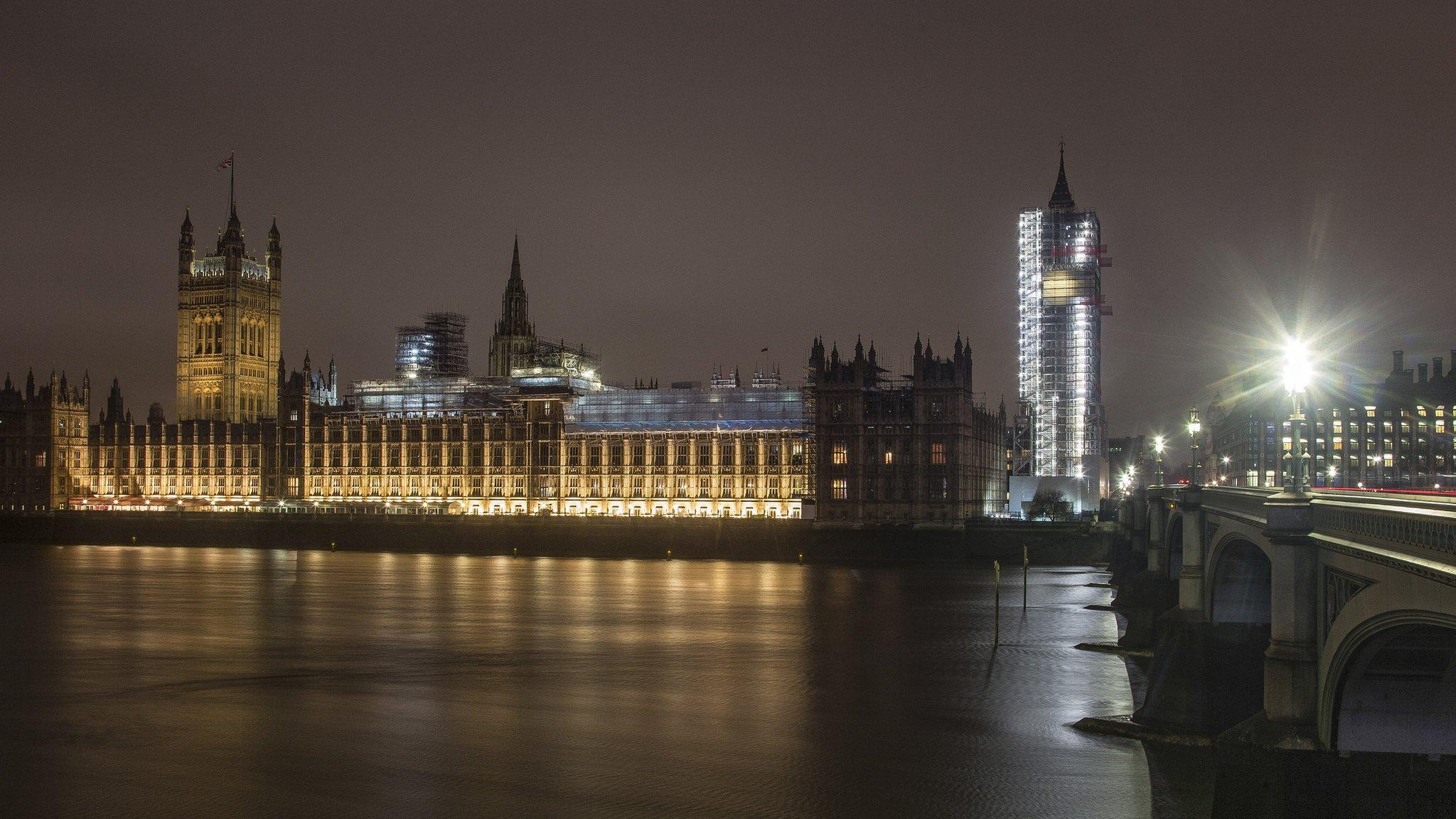'I do believe in Brexit,' says Theresa May
- Published
The prime minister rejects Boris Johnson's claims that she doesn't believe in Brexit
Theresa May has rejected claims she does not believe in Brexit - and insisted she would make a success of it "regardless of the outcome" of talks.
She told the BBC's Andrew Marr Show her plan for post-Brexit trade with the EU was not dead, despite it having been rejected by EU leaders.
And she urged the Tory party - in Birmingham for their annual conference - to "come together" and back it.
Boris Johnson has called her so-called Chequers plan "deranged".
In his latest broadside against her Brexit strategy, the former foreign secretary suggested he might be able to strike a better deal than her with Brussels.
He told the Sunday Times , external: "Unlike the prime minister, I fought for this, I believe in it, I think it's the right thing for our country and I think that what is happening now is, alas, not what people were promised in 2016."
Mr Johnson also set out domestic policy ideas, including building a bridge between Britain and Ireland and putting the HS2 scheme on hold to focus on a rail link in northern England.
Mrs May, who campaigned for Remain in the 2016 EU referendum, hit back at Mr Johnson in her Andrew Marr interview.
She said: "I do believe in Brexit. Crucially, I believe in delivering Brexit in a way that respects the vote and delivers on the vote of the British people while also protecting our union, protecting jobs and ensuring we make a success of Brexit for the future.
"That's why I want us to get a really good free trade deal with the European Union, which is what lies at the heart of the Chequers plan."
But she also said she was prepared for a "no deal" scenario, saying: "We will make a success of Brexit, regardless of the outcome of the negotiations."

Anti-Brexit campaigners stage a protest outside the Conservative conference
The Labour Party has said it will back Mrs May in Parliament if she agrees to their plan for a customs union with the EU and a Brexit deal that guarantees workers' rights and protects jobs.
Mrs May said: "My message to the Labour Party is that they should stop playing politics with Brexit and start acting in the national interest.
"My message to my party is let's come together and get the best deal for Britain."
Tories applaud Sir Digby Jones's attack on Boris Johnson
EU leaders have rejected her Chequers plan because they believe it would undermine the single market by allowing the UK to "cherry pick" bits of EU law it liked and ditch the rest.
Mrs May said: "We think we are putting forward a proposal that will maintain the integrity of the single market."
She said she wanted a more detailed response from the EU on their objections.
Later on Sunday, Foreign Secretary Jeremy Hunt hit back at the EU's negotiation stance in his speech to the party conference.
He said the EU seemed to want to "punish" the UK for leaving, and added: "If you turn the EU club into a prison, the desire to get out of it won't diminish, it will grow and we won't be the only prisoner that will want to escape."
Mr Hunt also addressed EU leaders directly, saying: "If you reject the hand of friendship offered by our prime minister, you turn your back on the partnership that has given Europe more security, more freedom, more prosperity, more opportunities than ever before in history."
In the main conference hall, pro-Brexit former CBI chief Sir Digby Jones gave a watching Mrs May a boost with a speech hailing her for standing up to the EU "bully boys" and attacking Mr Johnson as an "irrelevance".

Analysis
By Chris Mason, BBC political correspondent, in Birmingham
Just like the Labour conference last week, the Conservatives are keen to show us they have plenty of songs on their playlist.
But just like the Labour conference last week, one record is louder than all the others and seems jammed on repeat: Brexit.
Autumn guarantees two things: leaves falling off trees and Conservative conferences in which there is a series of deftly choreographed Johnsonian interventions, before and during the main event.
Forty-eight hours on from his 4,000 or so words for the Daily Telegraph, one word from Mr Johnson is sufficient to grab a headline or two today: "deranged".
The big question of the next few days, beyond the Brexit noise: does the PM offer any indication, however vague, of the possibility of her shifting on her much criticised Brexit plan?

But former Brexit Secretary David Davis, who like Mr Johnson quit the cabinet over Mrs May's Brexit proposals, told Sky News the Chequers plan "will die" because "it's just wrong".
He said he expected a free trade deal to be struck along the lines of a Canada-style agreement, adding that "we are going to have a very scary few months" as talks with the EU entered their final stages, but that was "normal".
On the Andrew Marr Show, Mrs May also defended the "hostile environment" immigration policies she introduced as home secretary, which led to people from the so-called Windrush generation losing their jobs, welfare benefits and right to remain in the UK.
She apologised for the fact that many long-standing UK residents of Caribbean origin had been caught by her Immigration Act, but declined to apologise for the policy itself.
Theresa May on hostile environment policy: "I apologise for the fact that some people who should not have been caught up in that... were caught up"
Mrs May wants to use the Conservative conference to focus on domestic issues as well as Brexit, after Labour unveiled a string of new policies at its conference last week.
She has announced plans to tackle a big increase in rough sleeping, to be funded by a tax on foreign-owned homes.
The Prime Minister also revealed plans for a Festival of Great Britain and Northern Ireland to showcase the nation in January 2022 - months before the next scheduled general election.
And Health Secretary Matt Hancock said health officials would produce guidelines on the amount of time young people should spend on social media.
- Published29 September 2018

- Published30 December 2020

- Published11 September 2018

